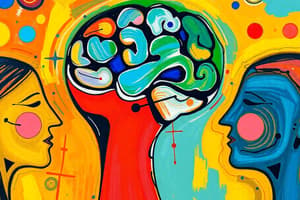Podcast
Questions and Answers
What is the most significant problem associated with a lack of self-awareness in the workplace?
What is the most significant problem associated with a lack of self-awareness in the workplace?
- Increased collaboration among team members
- Decreased stress and enhanced motivation
- Improved communication among colleagues
- Reduced team success and effectiveness (correct)
Which component of emotional intelligence involves recognizing your emotions and their impact on others?
Which component of emotional intelligence involves recognizing your emotions and their impact on others?
- Social awareness
- Self-awareness (correct)
- Self-management
- Relationship management
Why is emotional intelligence considered important in leadership?
Why is emotional intelligence considered important in leadership?
- It facilitates successful coaching and collaboration. (correct)
- It ensures technical skills are prioritized.
- It is solely based on IQ and cognitive abilities.
- It focuses primarily on the leaders' personal goals.
Why is self-management important for leaders in a stressful environment?
Why is self-management important for leaders in a stressful environment?
What does emotional intelligence encompass?
What does emotional intelligence encompass?
What percentage of people are estimated to be truly self-aware according to the research by Tasha Eurich?
What percentage of people are estimated to be truly self-aware according to the research by Tasha Eurich?
What percentage of employers value emotional intelligence more than technical skills?
What percentage of employers value emotional intelligence more than technical skills?
Who popularized the term 'emotional intelligence'?
Who popularized the term 'emotional intelligence'?
What is a common behavior associated with low emotional intelligence in workplace interactions?
What is a common behavior associated with low emotional intelligence in workplace interactions?
What effect does a lack of emotional intelligence typically have in the workplace?
What effect does a lack of emotional intelligence typically have in the workplace?
Flashcards
Emotional Intelligence (EQ)
Emotional Intelligence (EQ)
The ability to understand and manage your own emotions, as well as recognizing and influencing the emotions of others.
Why is Emotional Intelligence Important for Leadership?
Why is Emotional Intelligence Important for Leadership?
Leaders with high EQ effectively coach teams, manage stress, deliver feedback, and collaborate with others.
What is the Role of Technical Skills in Leadership?
What is the Role of Technical Skills in Leadership?
Technical skills are the foundation, but EQ is the key differentiator for success in leadership roles.
How Does EQ Impact Workplace Performance?
How Does EQ Impact Workplace Performance?
Signup and view all the flashcards
What are the Consequences of Low EQ?
What are the Consequences of Low EQ?
Signup and view all the flashcards
Low Emotional Intelligence
Low Emotional Intelligence
Signup and view all the flashcards
Self-Awareness
Self-Awareness
Signup and view all the flashcards
360-Degree Feedback
360-Degree Feedback
Signup and view all the flashcards
Self-Management
Self-Management
Signup and view all the flashcards
Reaction vs. Response
Reaction vs. Response
Signup and view all the flashcards
Study Notes
Emotional Intelligence in Leadership
- Emotional intelligence, or EQ, is vital for effective leadership. It's more important than technical skills for employers when evaluating candidates (71%).
- EQ is the ability to understand and manage emotions, recognizing and influencing those of others.
- John Mayer and Peter Salovey coined the term in 1990, popularized by Daniel Goleman.
Importance of Emotional Intelligence
- Technical skills are not enough for leadership roles.
- Emotional intelligence is key for successful team coaching, managing stress and conflict, and effective feedback and collaboration.
- Leaders with high EQ are more likely to: stay calm under pressure, effectively resolve conflict, respond empathetically to colleagues.
- Leaders with higher EQ perform 40% better in coaching, engagement and decision-making (DDI).
Components of Emotional Intelligence
- Self-awareness: Understanding your strengths, weaknesses, emotions, and their effect on others. 95% believe they're self-aware but only 10-15% truly are.
- Self-assessment and 360-degree feedback are useful.
- Self-management: Controlling reactions and emotions, especially under pressure, and maintaining a positive mindset.
- Social awareness: Recognizing and understanding the feelings of others, and recognizing dynamics within an organization. Empathy is key to this.
- Relationship management: Influencing, coaching and mentoring others, and effectively resolving conflict. Using empathy effectively resolves conflicts and improves team morale. Addressing conflict directly improves team outcomes and increases productivity.
Developing Emotional Intelligence
- Journaling: Reflect on emotional impact on decisions.
- 360° Assessments: Gather feedback from colleagues to identify any leadership gaps.
- Active listening: Focus on what others are saying (non-verbal and verbal cues).
- Emotional Awareness: Reflecting on emotional triggers to improve management.
- Training/Courses: Gain structured and formal training in emotional intelligence.
Studying That Suits You
Use AI to generate personalized quizzes and flashcards to suit your learning preferences.
Related Documents
Description
Explore the critical role of emotional intelligence (EQ) in effective leadership. This quiz examines how EQ impacts team dynamics, stress management, and conflict resolution. Discover the key components of EQ and why it's considered more vital than technical skills in leadership roles.



